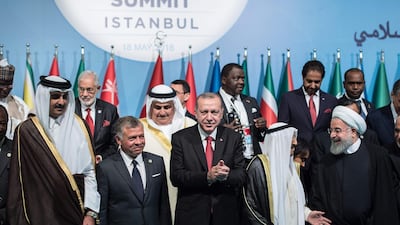A summit of Muslim heads of state in Istanbul on Friday called for the creation of an international peacekeeping force to protect the Palestinians, as host Turkish President Recep Tayyip Erdogan accused Israel of brutality comparable to the Nazis.
The 57-member Organisation of Islamic Cooperation (OIC) - seeking to bridge differences within the Muslim world - said in a final communique that Israel had carried out the "wilful murder" of about 60 Palestinians on the Gaza border on Monday.
It called "for the international protection of the Palestinian population, including through dispatching of international protection force".
Mr Erdogan said such an "international peacekeeping force" was essential to help the Palestinians and stop the international community being a "spectator to massacres".
He compared such a force to the UN forces sent to deal with the aftermath of the Balkan wars in Bosnia and Kosovo.
_______________
Read more:
'Why did you leave me?' Family mourns baby killed by Israeli tear gas
US ambassador walks out on Palestine at UN
Stars protest Gaza deaths at Cannes Film Festival
_______________
The statement also criticised the United States, saying that Washington was complicit in the crimes of Israel and "emboldened" its government by moving its embassy from Tel Aviv to Jerusalem.
The summit had been called at a few days notice by Mr Erdogan, who had earlier addressed thousands at an open air rally in Istanbul to express solidarity with the Palestinians.
Palestinian Prime Minister Rami Hamdallah - stepping in for President Mahmoud Abbas who this week had surgery on his ear - told the rally that the US was "trying to provoke a religious conflict in the region" by moving its embassy to Jerusalem.
Speaking at the opening of the summit, Mr Erdogan compared Israel's actions against the Palestinians in Gaza to the Nazi persecution of the Jews during the Second World War.
"There is no difference between the atrocity faced by the Jewish people in Europe 75 years ago and the brutality that our Gaza brothers are subjected to," he said, accusing Israel of using methods "similar to the Nazis".
About six million Jews were murdered by the Nazis during the Second World War.
Addressing the earlier rally, Prime Minister Binali Yildirim used similar language, saying Israel was "imitating Hitler and Mussolini" by occupying Palestinian territory and disregarding international law.
Mr Erdogan complained that Muslims had too often given a "shy and cowardly" image to their foes and failed to sort out internal disagreements.
Describing the issue of Jerusalem as a "test", he said: "If we need to speak clearly, the Islamic world failed in the Jerusalem test."
This is the second emergency OIC meeting Mr Erdogan has hosted in the space of six months after the December summit, also in Istanbul, that denounced US President Donald Trump's decision to recognise Jerusalem as the capital of Israel.
Disputes between the OIC's key players - notably between Sunni Saudi Arabia and Shiite Iran - always complicate the adoption of any measures going beyond harsh rhetoric.
Riyadh - which appears to have softened its stance on Israel as the influence of Crown Prince Mohammed bin Salman has grown - and its allies fear alienating the United States with tough measures against Tel Aviv.
Saudi Arabia's chief foreign policy preoccupation, shared with Israel, is ensuring US backing to contain Iran which both Riyadh and the Jewish state see as the main threat to regional peace.
In his speech, Iranian President Hassan Rouhani pointedly criticised "the silence of certain countries" without which "the Zionists would have never attempted such a brutality".
Both Cairo and Riyadh are wary of Turkey's support for the Muslim Brotherhood and Hamas, as well as its close alliance with Qatar which is currently under a Saudi-led embargo. The Egyptian and Saudi foreign ministers attended, but heads of state did not.
Mr Erdogan has craved a role as a leader within the Islamic world, rarely holding back with tirades against Israel although Ankara has diplomatic relations with the Jewish state.
Tensions with Israel and hosting such a meeting also do Mr Erdogan no harm with his core supporters as Turkey heads to presidential and parliamentary polls on June 24.
And he has emerged as one of the most outspoken critics of Israel after Monday's bloodshed, earlier this week even accusing it of genocide.
Israel, however, was the 10th-largest market for Turkish exports in 2017, buying some US$3.4 billion (Dh12.5bn) of goods, according to IMF statistics.
"We have excellent economic ties with Turkey. And these relations are very important for both sides," Israeli Finance Minister Moshe Kahlon told Israel Radio on Friday when asked if Israel should break ties with Turkey.
The plight of Palestinians resonates with many Turks, particularly the nationalist and religious voters who form a base of support for Mr Erdogan, who has been in power for 15 years.
The Turkish leader called for an international investigation into the crimes Israel has committed. "It will be called to account sooner or later," he said.

